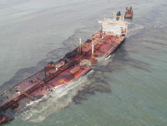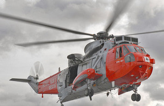Electronics Are Fine But You Need Eyes
 In this electronic age much of the danger which plagued the lives of sailors of old has been eliminated. Radar is there to give navigators eyes in fog or the dark. Reliable diesel engines have taken over from sail so that ships should not now become entrapped in a bay because the wind is against them. A distress signal can be sent at the touch of a button giving the name of the ship and its position to a remarkable degree of accuracy. Ships are steered automatically so that there is no helmsman to get tired, and hydraulics ensure that the massive load of a ship’s rudder can be handled, if necessary, with one hand.. An automatic chart unfolds on a screen before the navigator’s eyes and shows exactly where he is and what dangers lie around. He can punch in a few buttons and the ship will automatically steer from A to B. The crew is, in fact, redundant. Just as it is theoretically possible to put all the passengers on an aeroplane, shut the doors and send it crewless from UK to India it is theoretically possible to load a ship in Liverpool, shut all the hatches, and send it to New York
In this electronic age much of the danger which plagued the lives of sailors of old has been eliminated. Radar is there to give navigators eyes in fog or the dark. Reliable diesel engines have taken over from sail so that ships should not now become entrapped in a bay because the wind is against them. A distress signal can be sent at the touch of a button giving the name of the ship and its position to a remarkable degree of accuracy. Ships are steered automatically so that there is no helmsman to get tired, and hydraulics ensure that the massive load of a ship’s rudder can be handled, if necessary, with one hand.. An automatic chart unfolds on a screen before the navigator’s eyes and shows exactly where he is and what dangers lie around. He can punch in a few buttons and the ship will automatically steer from A to B. The crew is, in fact, redundant. Just as it is theoretically possible to put all the passengers on an aeroplane, shut the doors and send it crewless from UK to India it is theoretically possible to load a ship in Liverpool, shut all the hatches, and send it to New York
Why then, in this day and age, do ships of all sizes still get into trouble?
 The problems are, of course, twofold. So far electronics cannot think independently. They can be programmed to do various tasks, they can be programmed to deal with random situations which may arise but the point is – they have to be programmed. That means that every possible scenario has to be thought of, the answer worked out, and the electronic brain told what to do should such a situation arise. But the world is not like that and the unexpected and unforeseen happen. In that case the electronic brain frantically searchs for a course of action which it knows nothing about and, in the meantime, the ship ploughs remorselessly on.
The problems are, of course, twofold. So far electronics cannot think independently. They can be programmed to do various tasks, they can be programmed to deal with random situations which may arise but the point is – they have to be programmed. That means that every possible scenario has to be thought of, the answer worked out, and the electronic brain told what to do should such a situation arise. But the world is not like that and the unexpected and unforeseen happen. In that case the electronic brain frantically searchs for a course of action which it knows nothing about and, in the meantime, the ship ploughs remorselessly on.
The second part of the problem is that, for a variety of reasons, a crew needs to be carried, one of those reasons being the point just made. Only a human can cope with the unforeseen. As yet airline passengers show no sign of being happy with the idea of getting into a closed capsule and being fired from one country to the next, meals being served by a dumb waiter on the way. Maritime authorities throughout the world do not like the idea of totally automatic ships wandering around the oceans on their own and owners still like to feel that they have some control over their multi-million pound floating investment. So you still need a crew.
 There lies the snag – the human element, that which is supposed to oversee the electronic marvel and make sure it does its job. Everything necessary has been done to make the human’s life as easy and foolproof as possible. You don’t need half as many men as before so crew numbers can be cut at least in half., reduced still further by unscrupulous owners in order to save on the
There lies the snag – the human element, that which is supposed to oversee the electronic marvel and make sure it does its job. Everything necessary has been done to make the human’s life as easy and foolproof as possible. You don’t need half as many men as before so crew numbers can be cut at least in half., reduced still further by unscrupulous owners in order to save on the
wage bill. This last type of owner may lower the quality of the crew which is hired. To be fair only a minority of the ships sailing the oceans fall into this category – but all use human beings with the normal human failings. A heavy night out clubbing the day before sailing and the temptation is to rely entirely on the electronics. The knowledge that a short cut which shows on the chart will save a day at sea. The size of the ship is known and the electronic chart says that, if the steering is exact, the current not too strong, then the monster tanker can get through. A tired navigating officer, fumbling up the English Channel in fog, looks at the little dots on his chart and sees another dot approaching his ship. It is like navigating the M.25 at night in fog. His tired
brain does not function as it should, he waits a few moments too long, and you have a maritime pile up.
 So though the electronics need a human hand to oversee them that very hand is fallible. Pilot error can cause an accident in the air and the same may be said of the sea. On the night of 3rd August, 2011, a German container ship en route from Cork to Rotterdam ran aground on a beach by Pendeen Lighthouse. It was travelling at full speed at the time and fortunately slid onto soft sand at about half tide. The following morning it was refloated and continued on its way. What happened? The ship was travelling on autopilot, there were only two people on the bridge and both went to sleep. The Torrey Canyon crashed into the Seven Stones Reef because the Captain decided on a short cut and the ship was too big. In 2008 a brand new luxury motor cruiser ran straight on to the rocks at Zone Point, Falmouth. Travelling overnight with two people on board the man on watch went to sleep while the boat continued on autopilot. This sort of thing is not new. In 1893 the Mediterranean Fleet was on exercise and the world’s biggest battleships were steaming in two parallel columns. Admiral Tryon ordered the two columns to reverse by turning inwards. Unfortunately he had not allowed for the fact that there was insufficient room between the columns and. the two leading battleships ploughed into one another. The brand new battleship ‘Victoria’ went to the bottom.
So though the electronics need a human hand to oversee them that very hand is fallible. Pilot error can cause an accident in the air and the same may be said of the sea. On the night of 3rd August, 2011, a German container ship en route from Cork to Rotterdam ran aground on a beach by Pendeen Lighthouse. It was travelling at full speed at the time and fortunately slid onto soft sand at about half tide. The following morning it was refloated and continued on its way. What happened? The ship was travelling on autopilot, there were only two people on the bridge and both went to sleep. The Torrey Canyon crashed into the Seven Stones Reef because the Captain decided on a short cut and the ship was too big. In 2008 a brand new luxury motor cruiser ran straight on to the rocks at Zone Point, Falmouth. Travelling overnight with two people on board the man on watch went to sleep while the boat continued on autopilot. This sort of thing is not new. In 1893 the Mediterranean Fleet was on exercise and the world’s biggest battleships were steaming in two parallel columns. Admiral Tryon ordered the two columns to reverse by turning inwards. Unfortunately he had not allowed for the fact that there was insufficient room between the columns and. the two leading battleships ploughed into one another. The brand new battleship ‘Victoria’ went to the bottom.
Tragedies like these are caused by a few moments inattention or carelessness – something of which the electronics are never guilty. That is solely a human trait. And pure accidents happen. They happen far out at sea and happen close to land.. The forestay of a yacht snaps and the mast comes crashing down. The kayaker overestimates his physical capability and struggles hard against the wind to get back. The windsurfer thinks he is better than he is, tips over half a mile out, and lacks the skill to get upright. Dad takes his eyes off the kids and the wind drives the water toy seawards. The outboard runs out of fuel. All are potential fatalities, they are not fiction, they do happen – they are incidents from our Logbook over the years. If no one realises what has happened all can result in a death. It is why we have a lifeboat, why we have a helicopter – why we have the N.C.I. Someone needs to see the problem so help can be sent. You need Eyes Along the Coast and we could do with more volunteers.
The number to contact – Pat Rigley on 01872-501838.

